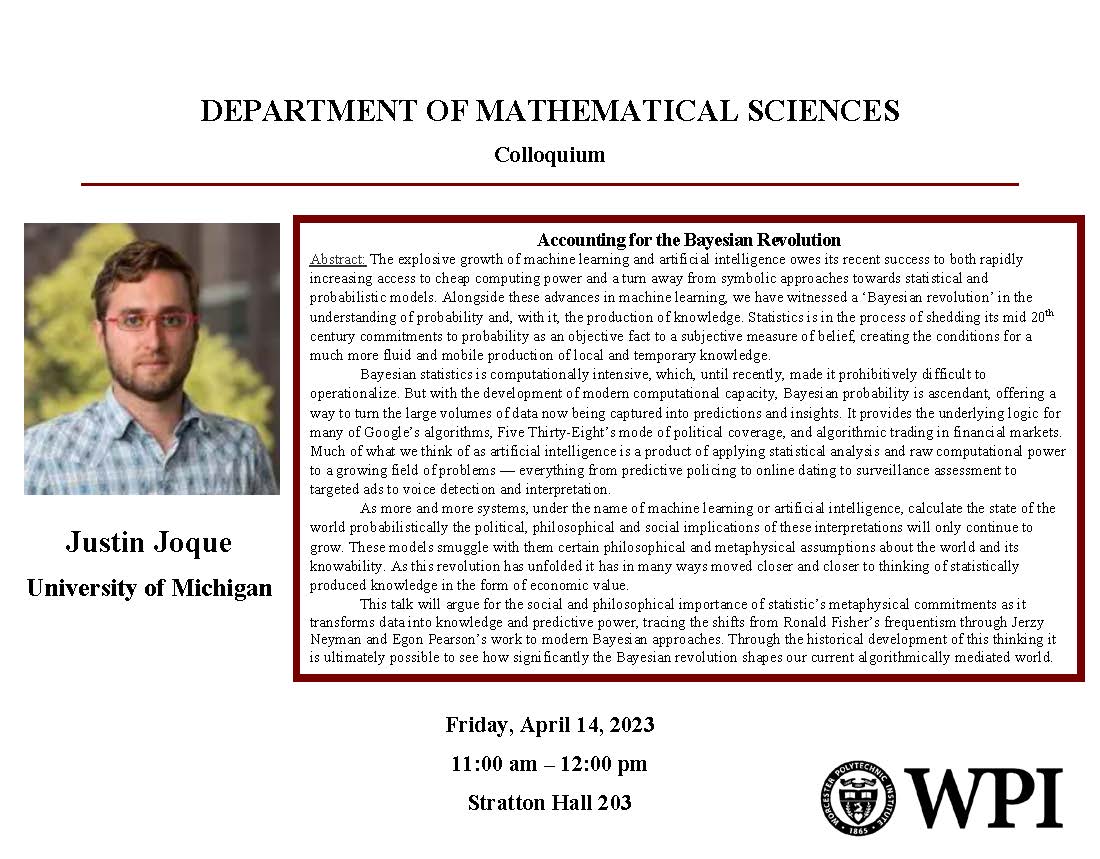Mathematical Sciences Department, Colloquium - Justin Joque, University of Michigan "Accounting for the Bayesian Revolution" (SH203)
11:00 a.m. to 12:00 p.m.

Mathematical Sciences Department
Colloquium
Speaker: Justin Joque, University of Michigan
Friday, April 14, 2023
11:00 am - 12:00 pm
Stratton Hall 203
Title: Accounting for the Bayesian Revolution
Abstract: The explosive growth of machine learning and artificial intelligence owes its recent success to both rapidly increasing access to cheap computing power and a turn away from symbolic approaches towards statistical and probabilistic models. Alongside these advances in machine learning, we have witnessed a ‘Bayesian revolution’ in the understanding of probability and, with it, the production of knowledge. Statistics is in the process of shedding its mid 20th century commitments to probability as an objective fact to a subjective measure of belief, creating the conditions for a much more fluid and mobile production of local and temporary knowledge.
Bayesian statistics is computationally intensive, which, until recently, made it prohibitively difficult to operationalize. But with the development of modern computational capacity, Bayesian probability is ascendant, offering a way to turn the large volumes of data now being captured into predictions and insights. It provides the underlying logic for many of Google’s algorithms, Five Thirty-Eight’s mode of political coverage, and algorithmic trading in financial markets. Much of what we think of as artificial intelligence is a product of applying statistical analysis and raw computational power to a growing field of problems — everything from predictive policing to online dating to surveillance assessment to targeted ads to voice detection and interpretation.
As more and more systems, under the name of machine learning or artificial intelligence, calculate the state of the world probabilistically the political, philosophical and social implications of these interpretations will only continue to grow. These models smuggle with them certain philosophical and metaphysical assumptions about the world and its knowability. As this revolution has unfolded it has in many ways moved closer and closer to thinking of statistically produced knowledge in the form of economic value.
This talk will argue for the social and philosophical importance of statistic’s metaphysical commitments as it transforms data into knowledge and predictive power, tracing the shifts from Ronald Fisher’s frequentism through Jerzy Neyman and Egon Pearson’s work to modern Bayesian approaches. Through the historical development of this thinking it is ultimately possible to see how significantly the Bayesian revolution shapes our current algorithmically mediated world.